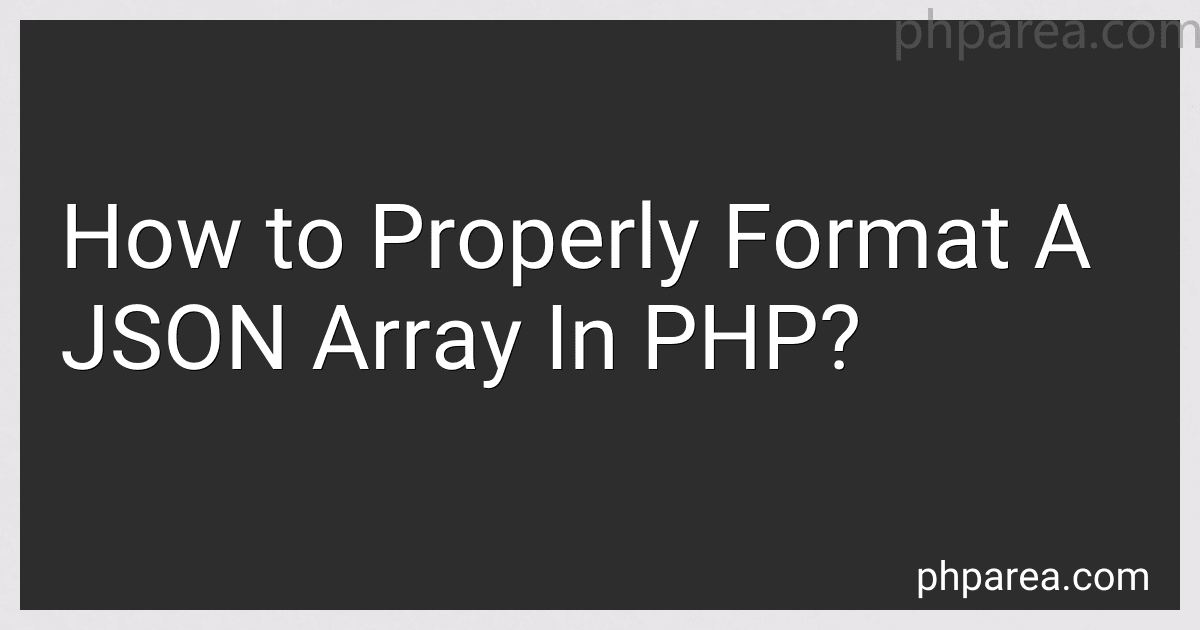Best JSON Formatting Tools to Buy in February 2026
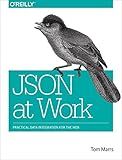
JSON at Work: Practical Data Integration for the Web


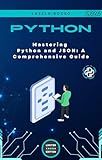
Mastering Python and JSON: A Comprehensive Guide: From Basics to Advanced Techniques: Parsing, Manipulating, and Creating JSON Data with Python (Micro Learning | Python Book 4)


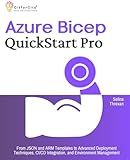
Azure Bicep QuickStart Pro: From JSON and ARM Templates to Advanced Deployment Techniques, CI/CD Integration, and Environment Management


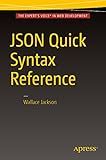
JSON Quick Syntax Reference


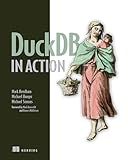
DuckDB in Action


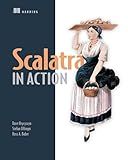
Scalatra in Action


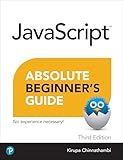
Absolute Beginner's Guide to Javascript, Third Edition


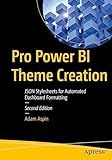
Pro Power BI Theme Creation: JSON Stylesheets for Automated Dashboard Formatting


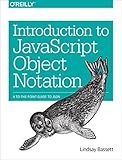
Introduction to JavaScript Object Notation: A To-the-Point Guide to JSON


When it comes to formatting a JSON array in PHP, there are several key considerations to keep in mind. Here is some information on how to properly format a JSON array in PHP:
- Create an array: Begin by creating an array in PHP. This array will contain the data you want to convert into JSON format.
- Assign values to the array: Assign values to the array using appropriate keys. These keys will become the property names in the resulting JSON array.
- Convert the array to JSON: Use the json_encode() function in PHP to convert the created array into a JSON formatted string. This function takes the PHP array as input and returns the JSON formatted string.
- Set the appropriate headers: Before outputting the JSON string, it's important to set the appropriate headers to inform the client that it is receiving JSON data. Use the header() function in PHP to set the content type to application/json.
- Output the JSON string: Finally, output the JSON string to the client using the echo statement or any other suitable method of output.
Here is an example code snippet that demonstrates the above steps:
// Create an array $data = array( "name" => "John", "age" => 30, "city" => "New York" );
// Convert the array to JSON $jsonData = json_encode($data);
// Set headers header('Content-Type: application/json');
// Output the JSON string echo $jsonData;
By following these steps, you can properly format a JSON array in PHP. It is crucial to ensure that your array structure is correct and that you use the json_encode() function to convert it to JSON format. Properly setting headers is also important for the client to recognize the data as JSON.
What are some common mistakes to avoid when working with JSON in PHP?
- Not validating the JSON data: It is crucial to validate JSON data for its correctness before processing it. Failing to do so may lead to unexpected errors or security vulnerabilities.
- Not handling decoding errors: When decoding JSON using functions like json_decode(), it is important to check for errors. If decoding fails, handling the error appropriately is necessary to avoid unexpected behavior in the code.
- Mixing up JSON arrays and objects: JSON supports both arrays and objects, but using them interchangeably can lead to confusion and errors. Understanding the JSON structure and using the correct data structure accordingly is essential.
- Not setting appropriate options for decoding: json_decode() function provides options like JSON_OBJECT_AS_ARRAY and JSON_BIGINT_AS_STRING. Failing to set these options appropriately may result in incorrect data output or loss of precision.
- Incorrectly serializing data to JSON: When encoding data to JSON using functions like json_encode(), it is important to ensure that the correct data types are used. Some data types like resources or private class properties may not be serialized correctly.
- Not handling encoding errors: Similar to decoding errors, encoding errors can occur while converting PHP data to JSON. It is important to handle these errors properly to avoid unexpected behavior or corrupted JSON output.
- Not considering security: When working with JSON data, it is important to consider security measures like validating and sanitizing user input. Failing to do so can lead to vulnerabilities like JSON injection or cross-site scripting (XSS) attacks.
- Not using proper error handling: JSON operations can lead to various errors, such as malformed JSON, encoding/decoding failures, or unexpected results. Proper error handling with appropriate error messages and logging should be implemented to facilitate debugging and troubleshooting.
- Mixing up associative arrays and objects: PHP allows using both associative arrays and objects interchangeably. However, JSON objects are converted to PHP objects by default. Mismatching their usage can lead to confusion and incorrect results, especially when encoding or decoding JSON.
- Not adhering to JSON standards: JSON has a specific set of standards for formatting and syntax. Failing to adhere to these standards can result in parsing errors or interoperability issues when working with JSON in PHP or other languages.
How to decode JSON data in PHP?
To decode JSON data in PHP, you can use the json_decode() function. Here's an example:
$jsonString = '{"name": "John", "age": 30, "city": "New York"}'; $data = json_decode($jsonString);
echo $data->name; // Output: John echo $data->age; // Output: 30 echo $data->city; // Output: New York
In this example, the json_decode() function takes a JSON string and converts it into a PHP object. You can access the values of the JSON data by using the object properties (e.g., $data->name). If you want to decode the JSON as an associative array instead of an object, you can pass true as the second parameter to json_decode(), like this:
$jsonString = '{"name": "John", "age": 30, "city": "New York"}'; $data = json_decode($jsonString, true);
echo $data['name']; // Output: John echo $data['age']; // Output: 30 echo $data['city']; // Output: New York
What is the equivalent of JSON array in JavaScript?
The equivalent of a JSON array in JavaScript is the JavaScript array object, which is denoted by square brackets [ ].
